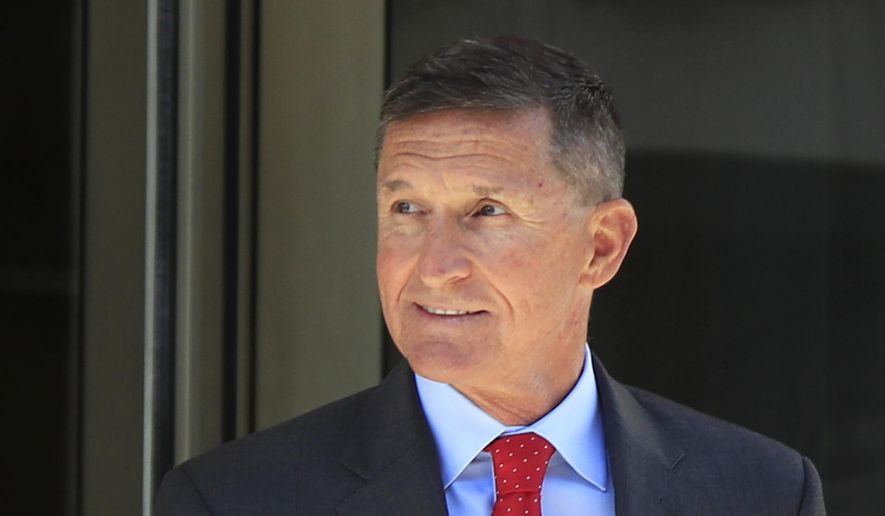Former National Security Adviser Michael Flynn in late 2016 urged Russia’s then-ambassador to the United States to avoid escalating its response to sanctions imposed by the Obama administration and asked for a more measured approach, transcripts released late Friday revealed.
The conversations between Flynn and then-Ambassador Sergey Kislyak at the heart of the criminal case against President Trump’s former national security adviser. Federal prosecutors had accused Flynn of lying to FBI officials when he said the two did not discuss the Russia sanctions.
Federal prosecutors had accused Flynn of lying to FBI officials when he said the two did not discuss retaliating against the outgoing Obama administration for the sanctions.
President Barack Obama expelled suspected intelligence agents and closed two Russian compounds in response to the country’s interference in the 2016 election.
The transcripts of three separate phone calls and a voice mail reveal that the pair did briefly discuss sanctions.
Flynn first tells Mr. Kislyak that if Russia is going to respond, they should take a “reciprocal” action, urging him not to inflame an already delicate situation.
“But I ask Russia to do is to not, if anything, I know you have to take some sort of action, to only make it reciprocal; don’t go any further than you have to because I don’t want us to get into something that have to escalate to tit-for-tat. Do you follow me?” Flynn said, according to the transcript.
Mr. Kislyak tells Flynn that sentiments in Moscow are “raging” over the sanctions, according to the transcripts.
“I know, I — believe me, I do appreciate it, I very much appreciate it,” Flynn responded, the transcript revealed. “But I really don’t want us to get into a situation where we’re going, you know, where we do this and then you do something bigger, and then you know, everybody’s got to go back and forth and everybody’s got to be the tough guy here, you know?”
Director of National Intelligence John Ratcliffe sent the documents to Congress after they were declassified this week by his predecessor acting Director Richard Grenell.
The transcripts detail phone calls from Jan. 5, 2016, Dec. 22, 2016, and Dec. 23, 2016, along with a voice mail and subsequent phone call on Dec. 29, 2016.
Although the sanctions are discussed, Flynn and Mr. Kislyak largely discuss the incoming Trump administration’s views on the Middle East.
“[Y]ou know that the strategic goal is stability in the Middle East,” Flynn said. “That’s the strategic goal. And, and, you know, between you and I, and you know this, and we know this, you know between Moscow and Washington. We will not achieve stability in the Middle East without working with each other against this radical Islamist crowd. Period.”
The transcript release comes after the Justice Department earlier this month decided to drop its case against Flynn, concluding FBI agents, including Peter Strzok, did not have a basis to interview Flynn in early 2017.
The Justice Department also said any misstatements made by Flynn during the interview were immaterial to the broader probe into Russian election interference.
Flynn was fired as national security adviser and then prosecuted for allegedly lying about two calls with Mr. Kislyak.
Flynn pleaded guilty in late 2017 to lying to the FBI, but was never sentenced. He also agreed to cooperate with ex-special counsel Robert Mueller’s probe into Russian election interference.
Mr. Mueller completed his investigation, concluding there was no evidence the Trump campaign conspired with Russia to influence the 2016 election.
Flynn earlier this year sought to withdraw his guilty plea.
Recently released documents have raised questions about whether the FBI set up Flynn. The FBI was set to close the Flynn probe before agents interviewed him because they found no evidence of wrongdoing.
However, Mr. Strzok and his lover, ex-FBI attorney Lisa Page, intervened to keep the case open. They also discussed trying to get Flynn to cop to the Logan Act, an arcane law from 1799 that has never been used to prosecute anyone.
The law, known as the Logan Act, bars U.S. citizens from conducting diplomacy with foreign governments.
A second document, a handwritten note, by former FBI counterintelligence director Bill Preistap wondered if the goal of the Flynn interview was to get him to lie so “we can prosecute him or get him fired?”
• Jeff Mordock can be reached at jmordock@washingtontimes.com.




Please read our comment policy before commenting.